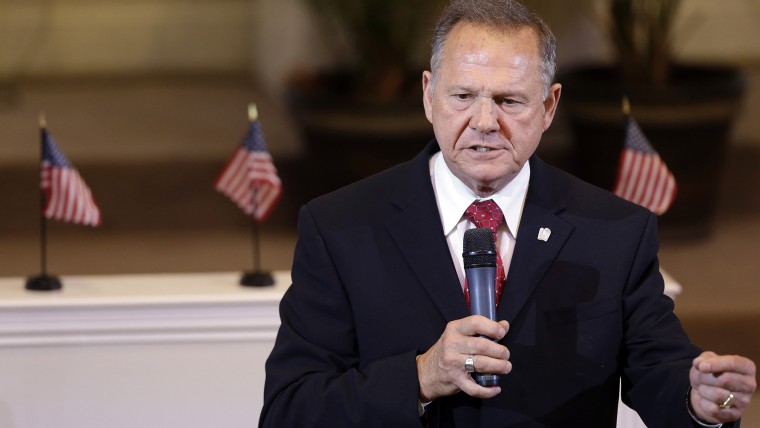To his credit, Sen. Jeff Flake (R-Ariz.) conceded yesterday that Roy Moore, the Republican U.S. Senate candidate in Alabama, represents a problem for his party. In particular, the Arizona senator pointed to Moore's insistence that Muslim Americans shouldn't be allowed to serve in Congress, regardless of voters' will.
"That's not right, and Republicans ought to stand up and say, that's not right," Flake said. The GOP senator, who conceded he was "troubled" by Moore's record, added, "I think that when we disagree with something so fundamental like that, we ought to stand up and say, that's not right, that's not our party, that is not us."
Flake, however, appears to be the only prominent Republican in D.C. raising these kinds of concerns.
Sen. Dean Heller of Nevada -- who faces a potentially tough primary and general election challenge this cycle -- told The Associated Press that he wasn't even aware that Moore had won the Alabama Republican primary on Tuesday, despite a day of nonstop TV coverage of the race about what his victory meant for Trump, McConnell and the GOP."Who won? I wasn't paying attention," Heller said. "I'm just worried about taxes."
Little known fact: "Who won? I wasn't paying attention; I'm just worried about taxes" is the official Republican Party platform condensed to 11 words.
Similarly, Sen. Rob Portman (R-Ohio) told Politico, in reference to Roy Moore, "He's going to be for tax reform, I think. I don't know, I don't know him."
We're left with a party facing a test, which requires them to balance a sense of limits with an unquenchable thirst for tax breaks for rich people. So far, it's a test the GOP is failing.
A reporter raised an interesting question at yesterday's White House briefing, asking Press Secretary Sarah Huckabee Sanders, "Are there any beliefs a candidate could hold, or actions a candidate can take that, that if he were still a Republican, the President would not endorse him?"
She responded that she won't "get into every potential hypothetical that any potential candidate may or may not have over the course of the time," which is a competent dodge, but the underlying question nevertheless deserves further consideration. Would the Republican Party's leaders, including Donald Trump, support literally any U.S. Senate nominee, based solely on party affiliation and the desire to give the wealthy tax breaks?
Call me naïve, but I think there are probably lines the party wouldn't cross. If primary voters nominated, say, David Duke to be the party's Senate nominee, I imagine more than a few Republican officials would balk. If primary voters backed someone with a history of violent felonies, I suspect we'd see a similar reaction.
The point, of course, is about what constitutes a bridge too far in contemporary GOP politics. Roy Moore believes he should be able to flout federal court rulings with impunity. He's argued repeatedly that homosexuality should be a literal crime. He's said religious minorities he doesn't like are not entitled to equal protection under the law. He blamed Americans for 9/11 and suggested the Sandy Hook Elementary massacre was divine retribution for Americans' wicked ways.
And really, I'm just scratching the surface here. We're talking about a fringe radical who believes his radical religious beliefs supersede American laws. Americans have been confronted with theocrats before, but not theocrats who've earned major-party U.S. Senate nominations.
If there is a limit in Republican politics, the question is whether Roy Moore's brand of Christian nationalism exceeds it. So far, the answer appears to be, "Tax breaks for the wealthy matter more."
That says at least as much about Moore's Republican brethren as it does about Moore himself.
